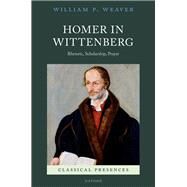Homer in Wittenberg Rhetoric, Scholarship, Prayer
, by Weaver, William P.- ISBN: 9780192864154 | 0192864157
- Cover: Hardcover
- Copyright: 2/17/2023
Homer in Wittenberg draws on manuscript and printed materials to demonstrate Homer's foundational significance for educational and theological reform during the Reformation in Wittenberg. In the first study of Melanchthon's Homer annotations from three different periods spanning his career, and the first book-length study of his reading of a classical author, William Weaver offers a new perspective on the liberal arts and textual authority in the Renaissance and Reformation. Melanchthon's significance in the teaching of the liberal arts has long been recognized, but Homer's prominent place in his educational reforms is not widely known. Homer was instrumental in Melanchthon's attempt to transform the university curriculum, and his reforms of the liberal arts are clarified by his engagements with Homeric speech, a subject of interest in recent Homer scholarship. Beginning with his Greek grammar published just as he arrived in Wittenberg in 1518, and proceeding through his 1547 work on dialectic, Homer in Wittenberg shows that teaching Homer decisively shaped Melanchthon's redesign of grammar, logic, and rhetoric. Melanchthon embarked on reforming the liberal arts with the ultimate objective of reforming theological education. His teaching of Homer illustrates the philosophical principles behind his use of well-known theological terms including sola scriptura, law and gospel, and loci communes. Homer's significance extended even to a practical theology of prayer, and Wittenberg scholia on Homer from the 1550s illustrate how the Homeric poem could be used to exercise faith as well as literary judgment and eloquence.







